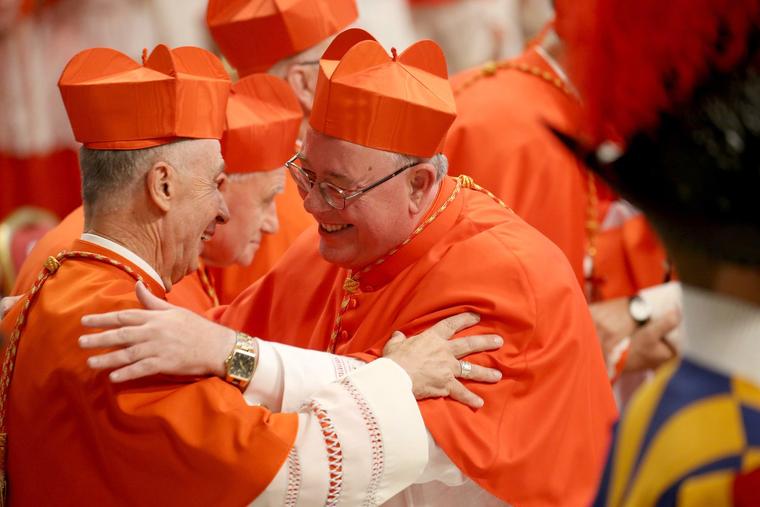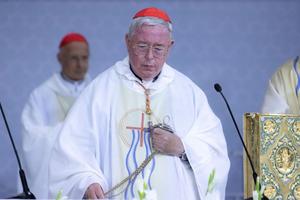Who Are the New Cardinal Members of Pope Francis’ Advisory Council?
The Pope has named Cardinals Hollerich, Lacroix, da Rocha, Omella and Vérgez to the C9

VATICAN CITY — Pope Francis’ appointment today of five new cardinals to advise him on Church governance aims to both rejuvenate the group he set up in 2013 to reform the Roman Curia and drive forward his vision for the Church.
Among the new members of the Council of Cardinals is Cardinal Jean-Claude Hollerich, the general relator of the 2021-2024 Synod on Synodality and already a close confidant of the Pope.
The Jesuit cardinal archbishop of Luxembourg has made a number of controversial statements over the past few years. Last year, he called for a revision of the Church’s teaching on homosexuality, and in 2019 supported the ordination of married men to the priesthood. In 2020, he told La Croix that he is open to women’s ordination. Just over a year ago, when COVID-19 still dominated headlines, he backed vaccine passports in churches.
Under Pope Francis’ pontificate, Cardinal Hollerich has risen up through the ranks to become one of today’s most powerful prelates. In 2018, he took over from Cardinal Reinhard Marx as president of COMECE, the Commission of Bishops’ Conferences of the European Union. As general relator of the Synod on Synodality, he is responsible for guiding the multi-year assembly that has generated concerns due to its apparent emphasis on listening to advocates for homosexual relations, women priests, and married clergy. In January, he said critics of the Synod on Synodality were afraid of a “Church on the move” and “know they won’t be able to stop” the process.
The nine-member Council of Cardinals was set up a month after Francis’ election in 2013 to advise him primarily on reform of the Roman Curia, one of the main mandates given him by his brother cardinals.
But in recent years, it has been seen by some as drifting into irrelevancy, especially since the publication last year of its main work, the curia’s apostolic constitution Praedicate Evangelium. Originally meant to have representation from every continent, it has also been hamstrung by the loss of members, most of whom weren’t replaced including the late Cardinal George Pell who left Rome in 2017 to defend himself against what proved to be false charges of sexual abuse in Australia. As a result, for a number of years the so-called “C9” had whittled down to be the “C6.”
But with the announcement of Francis’ renewal today, it returns to nine members. In addition to Cardinal Hollerich, the other cardinals are Gérald Lacroix of Quebec City; Sérgio La Rocha of São Salvador da Bahia, Brazil; Juan José Omella y Omella of Barcelona, Spain; and Legionary Fernando Vérgez Alzago, president of Vatican City State. They join three cardinals who have been members from the start: Cardinal Pietro Parolin, Vatican Secretary of State; Cardinal Sean O’Malley of Boston; Cardinal Oswald Gracias of Bombay. Cardinal Fridolin Besungu of Kinshasa replaced his Congolese predecessor on the Council, Cardinal Laurent Monsengwo Pasinya, in 2020.
Three long-serving members have now stepped down as their five year terms have ended: Cardinal Óscar Rodríguez Maradiaga, 80, the scandal-hit Archbishop Emeritus of Tegucigalpa, Honduras, who previously coordinated the Council; Cardinal Reinhard Marx of Munich, 69, one of the principal architects of the German Church’s highly contentious Synodal Way; and Cardinal Giuseppe Bertello, 80, Cardinal Vérgez’s predecessor.
Positions of Influence
In addition to Cardinal Hollerich, the other new members also already hold positions of influence.
Cardinal Sérgio La Rocha, 63, has been president of Brazil’s bishops’ conference since 2015 and was president of vocations and ministries of CELAM, the Latin American Episcopal Council. He took part in the 2015 Synod on the Family and was general relator for the 2018 Synod on Youth whose final document has been called “remarkably LGBT-positive” and used as a point of reference for the Synod on Synodality.
In 2021, the cardinal celebrated a Mass requested by LGBT groups in memory of murdered members of the LGBT community. The advocacy groups said they were surprised by the Mass and welcomed the fact that Cardinal La Rocha used the abbreviation “LGBTI+.”
The cardinal, whom Francis elevated to the College in 2016, has many other views in line with the pontificate: he has strongly backed Francis’ concern for creation, spends weekends in the poorest areas of Sao Salvador, and has publicly opposed abortion. Appointed auxiliary bishop by John Paul II in 2001, he is seen by some as papabile.
Cardinal Gérald Lacroix, one of seven children who grew up in a farming community in the province of Quebec, also took part in the Synod on Youth, and urged the Church to do a “better job” in offering improved formation on sexuality, affectivity, and the body.
An Institute of Pius X missionary who spent nine years in a Colombian war zone, he has said he believes Pope Francis “is a prophet” and is “bringing the Church to where it needs to be. He is purifying the Church.” Cardinal Lacroix took part in the 2015 Synod on the Family and welcomed the changes: “I love that way of discerning,” he said. “I’m very happy to see this happening today. This is really going to change the Church forever. It’s a new world.”
The cardinal has also served as co-chairman of the Committee on Life and Family of the Canadian bishops’ conference. Benedict XVI appointed him bishop in 2011 and Francis elevated him to cardinal in 2014.
‘Classic Francis Pick’
Cardinal Juan José Omella y Omella, from the Catalan-speaking part of Aragon, served a year as a missionary in the Democratic Republic of Congo. Since John Paul II appointed him an auxiliary bishop in 1996, he has led three dioceses and served as apostolic administrator in two. Since 2020, he has been president of Spain’s bishops’ conference. He has been a member of the Dicastery for Bishops since 2014, giving him influence over the future of Church leadership in Spain. Pope Francis elevated him to the College of Cardinals in 2017.
Cardinal Omella has said that after the Second Vatican Council, the Church has wanted “to be the Samaritan Church,” accompanying the suffering people of the world. He said he also believes the Church has to “unite institutions for the common good, so that no one feels cast aside.”
Described in 2017 by papal biographer Austen Ivereigh as a “classic Francis pick” for his focus on the peripheries and the poor, the cardinal agreed with the Pope’s controversial 2016 apostolic exhortation on the family, Amoris Laetitia, as he said such moral issues are "not all black and white" and the work of “accompaniment is vital." He also opposed the four Dubia cardinals for publicly asking the Pope for clarification on key moral teachings in the exhortation. “Obedience to the pope means walking with him,” he said. “A public fight is neither appropriate nor edifying for the people of God.”
Lastly, Cardinal Fernando Vérgez Alzago, 78, is a Spanish prelate from Salamanca. He was ordained a priest of the Legion of Christ in 1969. He has had a long career in the Roman Curia, first becoming an assistant in the Congregation for Religious in 1972 and holding several positions in other dicasteries and departments. Pope Francis promoted him to be Secretary General of the Governorate of Vatican City State in 2013.
In October 2020, he appointed him to a five-member commission led by Cardinal Kevin Farrell to monitor contracts that are not subject to new anti-corruption norms for security reasons. After succeeding Cardinal Bertello as president of Vatican City State in 2021, Pope Francis elevated him to archbishop and to cardinal in 2022.
The Council of Cardinals convenes every few months for two or three days. During its last meeting in December, subjects covered included the Synod on Synodality, the protection of minors and the recent COP27 meeting on climate change. The next meeting is scheduled for April 24.

















